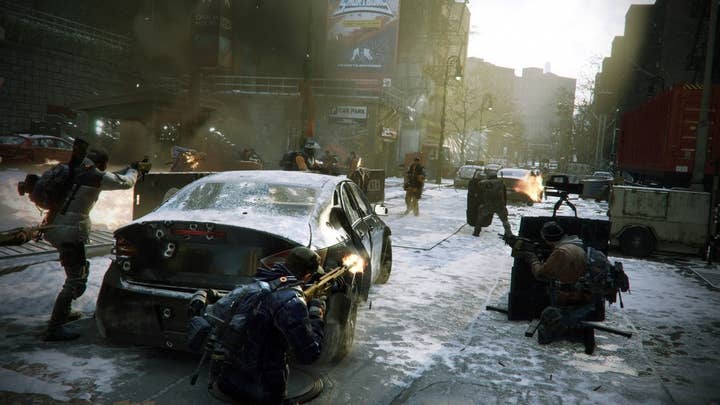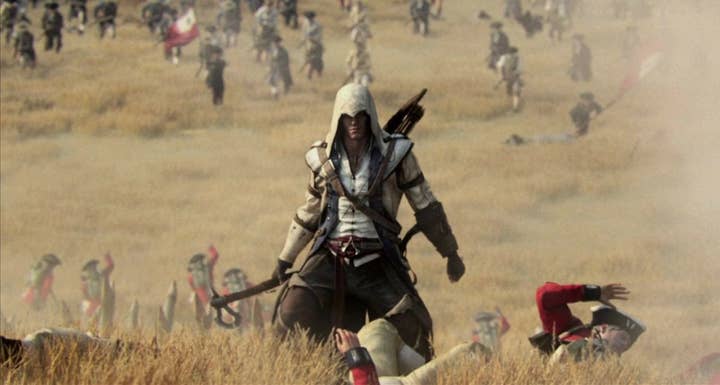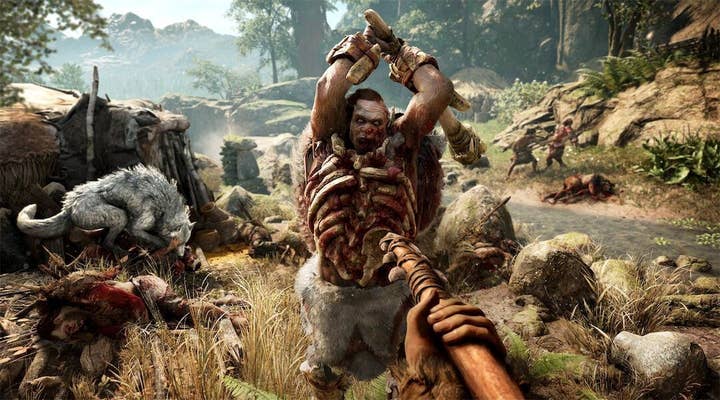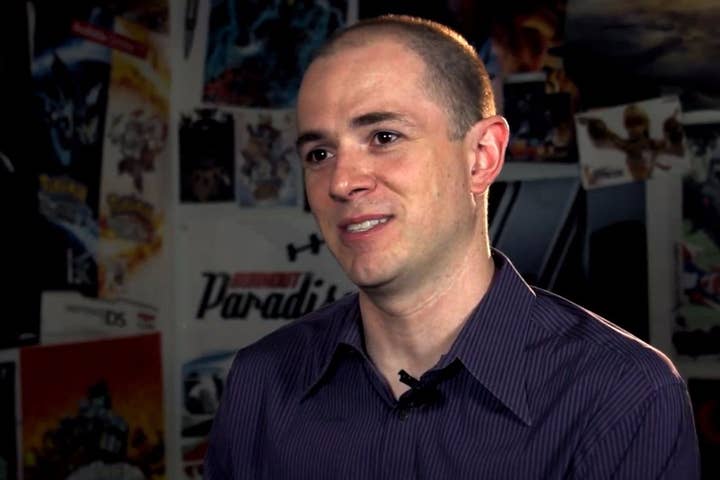Ubisoft: Creativity and commerce in AAA development
Creative director Alex Hutchinson reflects on the balance between satisfying the players, answering the critics, and managing a AAA team
Alex Hutchinson has a confession. His talk at Berlin's Quo Vadis conference promised, "Ten core principles for directing a successful game team." The room was packed, every seat was occupied, and yet Hutchinson failed to deliver.
"I lied," he says when we meet a few hours after his talk ends. "There's only eight. Ten is what it felt like there should be, for marketing purposes; for the back of the box."
As a creative director at Ubisoft Montreal, Hutchinson knows a thing or two about the importance of the, "back of the box." At a time when fewer and fewer games are being sold in boxes of any shape or size, he has led the development of the kind of blockbusters for which physical retail remains the most viable channel: Assassin's Creed III, Far Cry 4, and, during his time at Electronic Arts, Army of Two: The 40th Day. Let's put it this way: if Hutchinson believes ten is the best number to sell his premise to an expectant audience, we're more inclined to take notes than to argue the toss.
"Development time has been growing over the course of my career... You can count on your hand, probably, how many big games you have left in you"
Of course, he might have decided to make up the shortfall with an update on his latest project. Back in November 2014, Hutchinson revealed that Ubisoft had granted him and a small group assembled from his Assassin's Creed III and Far Cry 4 teams to flesh out an idea for a new IP; a more "personal" concept that could "compete at a high level" without needing "a thousand people" to make it a reality. At the time, Hutchinson intimated that, if Ubisoft kept faith in the idea, more would be revealed in around a year. Now, 18 months later, Hutchinson is maintaining that silence, his obvious enthusiasm restrained by the watchful gaze of a PR handler.
The only possible insight arrives indirectly, as part of a broader conversation about the escalating scale of AAA games. "You want to do a small project, but then you're like, 'You know what? There's some good stuff in here, we could grow this,'" he says. "You see an opportunity there, or the company gets excited. It's hard to keep things small. It's very hard to keep things small."
While that may or may not apply to Hutchinson's unannounced project, it's certainly true of the company at which he works. Like Destiny, Ubisoft's The Division is part of a new wave of console blockbusters, based on persistent, evolving worlds and driven as much by the actions of the community as the whims of their designers. In his six years at Ubisoft Montreal, Hutchinson has shipped two games; if The Division retains the interests of its players, it's not out of the question that an influential team member could work on it for that entire period, and possibly longer.

"Yeah, it's a bit scary," Hutchinson admits. "The development time has been growing and growing over the course of my career. These days, signing up for anything is a two or three year investment, usually, which in the old days was three games.
"And it is a little scary, even at three years, to imagine how much time you're putting into each project. I talk to my friends - who are all coming up against 40 these days - and you can count on your hand, probably, how many big games you have left in you. That's an odd moment, to say, 'I've probably got three or four left, if I even manage to keep doing it.'"
A great many AAA developers have chased the ideal of independence for this very reason, departing major publishers to return to shorter production cycles and the possibility of bringing more of their ideas to fruition. Doing so, however, also carries the risk of sacrificing quality-of-life. A game like The Division, Hutchinson says, is only made possible through careful planning, so its scale, while daunting at first glance, actually becomes a protection against crunch and burnout. "If you need to keep working on the game and releasing content, you can't get to [launch day] and have it so everyone's exhausted and disappears for three months," he says. "You probably need most of the team to come back on Monday."
"The old days of death marches and insane schedules, at least in the console space, I don't see it any more"
The same is also true of games like Assassin's Creed and Far Cry, both of which are still developed under a more traditional franchise model. "Realistically, I don't think any big company, or any successful company, is still working that way," Hutchinson says. "Some element of overtime and putting everything you can towards the end of a project is, I think, a little unavoidable, and it's also positive... There's a delicate balance, because you don't want to shoot down passion. But having lived that when I was in my twenties, and looking back on it and realising that it was addictive but unhealthy, we do try to encourage people not to do it. You want to let people push themselves, but we send them home all the time.
"The old days of death marches and insane schedules, at least in the console space and the mainstream video game space, I don't see it any more. And especially on big teams, it's not even feasible. If someone checks in at 1am and blows up the build nobody likes it, nobody appreciates those extra hours. I don't think it works.
"My gut tells me that it probably still occurs in the startup realm, though, so you could probably see those crazy, burnout schedules more in mobile development, in little teams."
If accurate, this represents a significant shift in the perception of crunch, which, through a handful of highly publicised controversies, became associated with the industry's largest companies. Today, however, it might be the case that a publisher like Ubisoft, which works to a schedule that demands close collaboration and tight logistical control, is the best place to work for those who wish to mitigate any potential impact a career in game development might have on their personal lives.

For Hutchinson, it isn't a matter of trading work-life balance for creative freedom, either. He describes Assassin's Creed III and Far Cry 4 as "stealth new IPs" in the freedom they afforded his team to play with and add to the fundamentals of each series. "They are a lot more fun to work on than a traditional sequel," he says, even if certain ideas and features remain consistent across multiple games. Indeed, Hutchinson believes that the importance the press ascribes to relentless innovation is a sign of the difference in the values held by reviewers, and those held by the consumers they purportedly represent. Be it League of Legends, Destiny, The Division or Overwatch, the majority of gamers are actively seeking out experiences that will be consistent and - to varying degrees - predictable over long stretches of time.
"I do it myself with music," he says. "I'm not a giant audiophile, but the bands I like, they put out a new album and I buy it. Often I won't even check the reviews. Once people find something that they enjoy, that they care about, it's up to us to lose them. Once you've played X amount of games over X amount of years, you're pretty dedicated to the content... And I think it's less familiarity than it's just enjoying the content. That's the misunderstanding. I think players honestly like it, because if they didn't it's still $60 or $70. It's still a lot of money."
"Once people find something that they enjoy, that they care about, it's up to us to lose them"
The challenge for a company like Ubisoft, then, is to find the right balance between satisfying the desire for new content from a given IP, and its own ability to produce that content while sustaining a consistent level of quality. Hutchinson seems confident that this is already the case, though it's not unfair to highlight the existence of evidence to the contrary. For example, the press found striking similarities between the map for Far Cry: Primal and that of its direct predecessor, Far Cry 4. Whether those similarities were intentional is almost beside the point; all that Ubisoft should care about is that so many people found the idea credible, linking it to years of the publisher's open-world games drawing from an apparently shared pool of systems and concepts.
Hutchinson makes no attempt to deny that Ubisoft's open-worlds are structured in similar ways, but he sees it as no different to a three-act play in the theatre. "In most mature art forms there is a structure, and I think for open-world adventure the structure that we all work towards has been really successful," he says. "The challenge, as a developer, is that even though [that structure] might be visible on a low level when you're playing, usually it's not that interesting to reinvent it.
"I think you'll see less and less of it moving forward, but we were more looking at reinventing the combat system, or changing the activities that we give the player. That's what we were working on. Whereas how we unlock those activities? It felt less important. But yeah, I think it's become too visible... I can't see too many people [at Ubisoft] not shaking that up in the near future."

Though Hutchinson doesn't make the link himself, it seems likely that Assassin's Creed has been allowed some time away from its rigid annual schedule for this very reason. If that does prove to be the case, and if - as Hutchinson suggests - Ubisoft's creative teams are seeking to address the "visibility" of the common aspects of its biggest franchises, it will be fascinating to see the games that result from those efforts. Hutchinson's talk emphasised the importance of designers putting a personal stamp on their projects, regardless of scale or the relative expense involved in their creation. He cited the opening of Far Cry 4, in which the player can finish the game bloodlessly within 20 minutes by following a simple command, as one example of that. And Hutchinson believes Ubisoft consistently shows daring within the established parameters of its own franchises, leaping between periods of history in Assassin's Creed, examining politically divided states in Far Cry, and modern surveillance technology in Watch Dogs.
"I got into this business to one day get a blank piece of paper, and not have to inherit anything from someone before"
Indeed, Hutchinson seems to take comfort from the fact that these content decisions have occasionally led to a backlash. One instance that affected him personally involved the box-art for Far Cry 4 being called out for carrying racist overtones; a mistaken impression born from the hot-take culture that now pervades online media, and the fact that Ubisoft Montreal was genuinely presenting the games press with imagery and ideas that departed from gaming's relatively limited norms. "It only annoys me when it's factually inaccurate. That's what really frustrates me, and that's when I tend to tweet and get yelled at by various parts of the world," Hutchinson says. "Personally, I don't think there's any harm in having strong opinions. It's okay for all of us to have them. It doesn't change anything, but the audience is still a little reactionary in video games.
"What's the quote? 'Any publicity is good publicity,' which was said, what? 100 years ago? In video games that's still very true. If people are talking about your content you're having a good day. If everyone is hating on it maybe that's not such a good day, but when there's an active discussion about, 'Is this interesting? Is this worthwhile? Is this something we should have in games?' That's a great discussion. Personally, I love that stuff, but I think there's a level of fear in any big company about what can come out of that in the long term."
Which brings us back to Hutchinson's next game; an original IP with a personal slant that may or may not be as small as be initially thought. We'll learn more about that in good time, but for now it's clear that, for all of the pleasure and freedom that can be gleaned from working within an established universe, Hutchinson is delighted to be stepping out into the unknown.
"I got into this business to one day get a blank piece of paper, and not have to inherit anything from someone before," he says. "So, 15 years in, it's exciting to have that opportunity to try something completely new."
GamesIndustry.biz is a media partner for the Quo Vadis conference. Our travel and accommodation costs were provided by the organiser.

